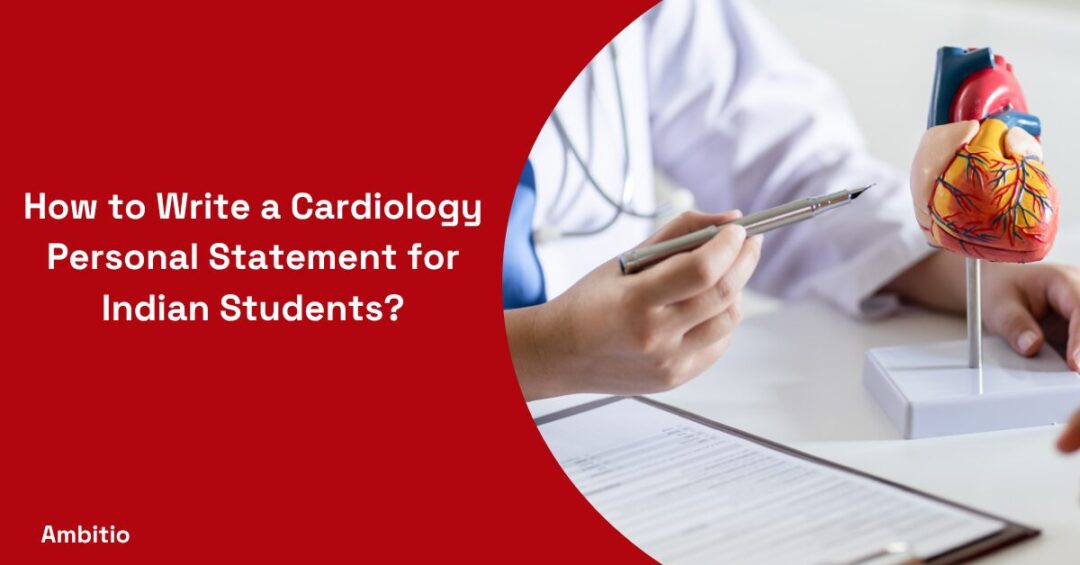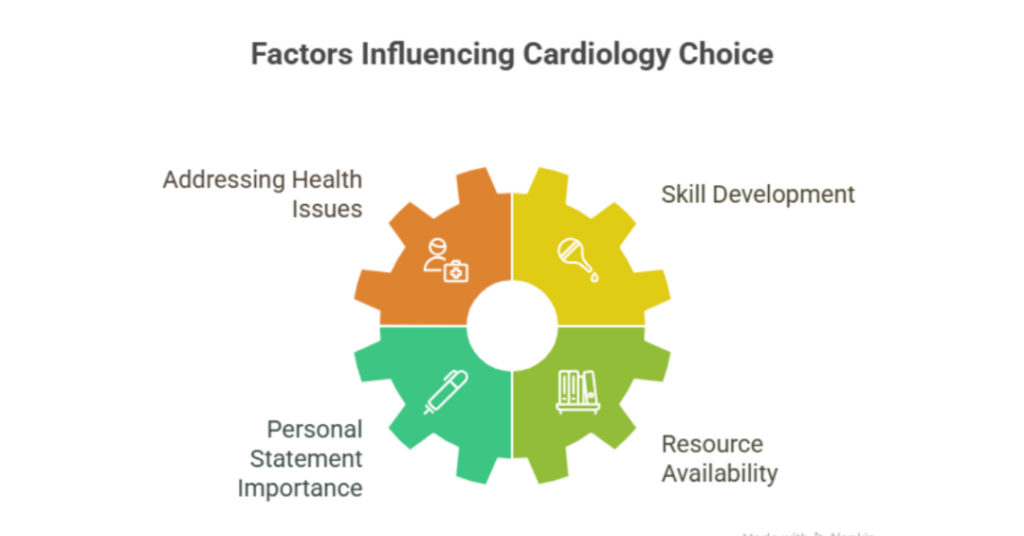30 May 2025
6 minutes read
How to Write a Cardiology Personal Statement for Indian Students?

Key Takeaways
- Cardiology personal statement plays a crucial role for Indian students to showcase clinical experience, research, and passion in fellowship applications.
- Highlighting strong clinical foundations, academic achievements, and clear future goals strengthens your candidacy.
- Expert help from Ambitio can turn your profile into a compelling story that opens global opportunities.
Did you know that cardiac diseases remain a leading cause of death globally, making cardiology one of the most demanding specialties? Indian students face brutal competition in securing cardiology fellowship and residency programs, often struggling to demonstrate clinical experience, communication skills, and passion for cardiology in their personal statements.
A strong cardiology personal statement is vital to highlight your diagnostic skills, clinical trials, and future goals, especially for residency applications in the U.S. or an echocardiography fellowship. This guide helps applicants build a solid foundation, address red flags, and improve cardiovascular health advocacy with realistic, practical advice.
Why Cardiology is a Top Choice Among Indian Students?
Cardiology is a top choice among Indian students due to its vital role in addressing acute coronary issues, arrhythmia, and heart failure in a large population. Through rigorous rotations, diagnostic procedures, and electrophysiology studies, applicants gain skills necessary for compassionate care in intensive care and rehabilitation units.

Writing a strong cardiology personal statement for university applications helps MD and PhD candidates highlight clinical accomplishments and future goals. Access to online for free resources and fellowship programs benefits those seeking advancement in general cardiology, imaging, and intervention.
What makes a Strong fellowship personal statement for Cardiology?
A strong cardiology fellowship application personal statement must clearly assess the applicant’s journey from undergraduate studies to medical school, highlighting a strong foundation in the field of cardiology. Indian students should showcase clinical experiences in care units, managing symptomatic patients, and understanding rhythm and heart health.
Mentioning research as first author and overcoming challenges faced adds depth. Including qualifications like GPA, IELTS, or TOEFL scores strengthens the application, especially for top programs at Columbia University, Harvard, Stanford, or University of Pennsylvania guided by expert faculty members in radiology and cardiology fellowship programs.
Key Elements of a Strong Interventional Cardiology Personal Statement
Writing a compelling cardiology personal statement is crucial for Indian students aspiring to become interventional cardiologists.

It should reflect your clinical skills, understanding of cardiac physiology, and commitment to the specialty while showcasing your goals and qualifications clearly.
1. Clear Motivation and Passion for Cardiology
Express why you chose interventional cardiology and how your experiences shaped this decision. Demonstrate your enthusiasm for improving heart health and your desire to advance as a compassionate physician.
2. Strong Clinical and Academic Foundation
Highlight your undergraduate and medical school training, focusing on physiology and hands-on experience. Mention any relevant rotations and how they prepared you for complex interventional procedures.
3. Research and Publications
Include any research work, published papers, or contributions, ideally with links to your work in PDF format. This shows your commitment to advancing the field and your analytical skills.
4. Awareness of Scholarships for International Students
Discuss your knowledge of scholarships for international students, especially at prestigious institutions like the University of Glasgow or Imperial College London, and how you plan to leverage these opportunities for your training.
5. Alignment with Fellowship Program Goals
Tailor your statement to demonstrate how your skills and ambitions fit with the cardiology fellowship program’s values, emphasizing your readiness to contribute as a future cardiologist.
Tips for Writing the Prefect Personal Statement for Cardiology
Writing a cardiology personal statement can be daunting, especially for Indian students navigating a highly competitive selection process. Your statement must not only convey your passion for cardiology but also demonstrate your clinical experience, personal growth, and future ambitions.
To help you create a compelling narrative, here are detailed tips that will guide you through the process.
1. Start with a Strong and Personal Introduction
Begin your cardiology personal statement by sharing what initially sparked your interest in the field. Whether it was a patient interaction, a clinical rotation, or a personal experience, this hook should be sincere and engaging. A well-crafted introduction sets the tone and encourages the reader to continue.
2. Highlight Your Clinical Experience and Skills
Indian students should clearly describe relevant clinical exposures during medical school and residency that helped build a solid foundation in cardiology. Detail specific experiences such as managing cardiac patients, diagnostic procedures, or rotations in cardiac care units. Show how these shaped your understanding of the specialty and strengthened your skills.
3. Showcase Your Personal Qualities and Growth
Beyond clinical expertise, emphasize personal attributes like empathy, resilience, teamwork, and communication skills. Admissions committees look for candidates who can work compassionately with patients and collaborate effectively with multidisciplinary teams. Reflect on challenges you’ve overcome and how they contributed to your growth as a future cardiologist.
4. Be Honest, Authentic, and Reflective
Avoid using clichés or generic statements often seen in many applications. Instead, provide authentic insights about your motivations, learning moments, and aspirations. Sharing your unique story and lessons learned creates a genuine connection with the reader and differentiates your statement.
5. Clearly State Your Future Goals and Alignment
Conclude by outlining your career objectives within cardiology and how the fellowship or residency program aligns with these goals. Explain what you hope to achieve in the field and how you intend to contribute to advancing cardiac care. This demonstrates your commitment and vision, making your application memorable.
Sample Cardiology Personal Statement Examples for Indian Students
Crafting a compelling cardiology personal statement is a crucial step for Indian students aspiring to specialize in this challenging yet rewarding field. Your personal statement should not only reflect your passion and clinical experiences but also highlight your ability to contribute meaningfully to advancing cardiovascular health.
Below is a personal statement example that demonstrates these qualities, followed by insights on what works well and areas for improvement.
Personal Statement Example
From my earliest clinical rotations as an undergraduate medical student, I was drawn to the complexity and impact of cardiovascular diseases. Witnessing patients with acute coronary syndromes, arrhythmia, and heart failure struggling for care in intensive care and rehabilitation units deeply motivated me to pursue cardiology as my specialty. This passion grew during my residency program, where I gained hands-on experience assessing symptomatic patients, performing diagnostic procedures, and supporting interventions that dramatically improved heart health.
My clinical experience, combined with rigorous academic training, has given me a strong foundation in cardiac physiology and electrophysiology. I have actively participated in rotations within cardiology care units and radiology departments, which broadened my understanding of imaging and intervention techniques. Working under the guidance of dedicated faculty members, I contributed to clinical trials aimed at improving diagnostic accuracy for acute coronary events. These experiences refined my skills necessary for a future cardiologist, including critical thinking, compassionate patient care, and effective communication.
I also recognize the importance of research in advancing cardiovascular health. As a first author of a study on rhythm abnormalities published in a peer-reviewed journal, I developed an analytical mindset and an appreciation for evidence-based medicine. Balancing this research with my clinical duties taught me resilience and time management, challenges faced by many applicants pursuing competitive fellowship programs.
Aware of the global standards in cardiology, I have prepared myself for international opportunities by achieving competitive scores in IELTS and TOEFL, alongside maintaining a strong GPA. I am particularly inspired by the cardiology fellowship programs offered by institutions like Columbia University, Harvard University, and the University of Pennsylvania, where cutting-edge research and patient care intersect. These programs’ emphasis on general cardiology and interventional techniques aligns perfectly with my future goals.
I am eager to bring my skills and passion to a cardiology fellowship program that fosters both clinical excellence and research innovation. As an Indian student, I am committed to improving cardiovascular health not only within my community but also on a broader scale by advocating for preventive care and advanced treatment methods. I believe my background, qualifications, and motivation make me a strong candidate ready to contribute meaningfully to the field of cardiology.
What Works and Why
This personal statement effectively balances clinical experience with research accomplishments, showing a strong foundation in both practical and academic aspects of cardiology. It clearly communicates passion and commitment, while highlighting relevant skills such as communication and resilience. The mention of international exams and specific fellowship programs adds focus and direction, making the applicant’s goals transparent and aligned with program expectations.
Improvements You Can Learn From
While the statement is strong, adding more personalized anecdotes or reflections on patient interactions could enhance emotional connection. Also, including specific examples of leadership or teamwork during clinical rotations might better demonstrate interpersonal skills. Lastly, a brief discussion about overcoming particular challenges unique to Indian students could provide greater authenticity and depth.
Conclusion
Crafting a compelling cardiology personal statement is a crucial step for Indian students aiming to excel in this competitive specialty. Your personal story, clinical experiences, and passion for cardiology must shine through to make a lasting impact on admissions committees.
If you want to turn your aspirations into reality with expert guidance tailored to your unique profile, Ambitio is here to help. Our specialized profile-building services and personalized mentorship empower you to create standout applications that open doors to top cardiology fellowship programs worldwide.
Ready to transform your future? Connect with Ambitio Elite today, where your journey to becoming a cardiologist begins!
FAQs
What is the purpose of a cardiology personal statement?
A cardiology personal statement demonstrates your qualifications, motivation, and dedication to the field of cardiology.
How should I structure my cardiology personal statement?
Start with your background and motivation, discuss relevant clinical and research experiences, and explain why the specific fellowship fits your goals.
How can I make my cardiology personal statement stand out?
Be authentic and share personal stories or experiences that inspired your interest in cardiology, highlighting unique aspects of your journey.
Do I need different cardiology personal statements for each program?
If applying to different types of fellowships, tailor each cardiology personal statement; otherwise, one version may suffice unless programs differ significantly.
What common mistakes should I avoid in my cardiology personal statement?
Avoid generic statements, lack of focus, and failing to connect your experiences to your interest in cardiology.
How long should my cardiology personal statement be?
Typically, a cardiology personal statement should be one page, concise yet comprehensive.
Should I discuss research in my cardiology personal statement?
Yes, mentioning relevant research in your cardiology personal statement strengthens your application by showing your commitment to advancing the field.

You can study at top universities worldwide!
Get expert tips and tricks to get into top universities with a free expert session.
Book Your Free 30-Minute Session Now! Book a call now




























